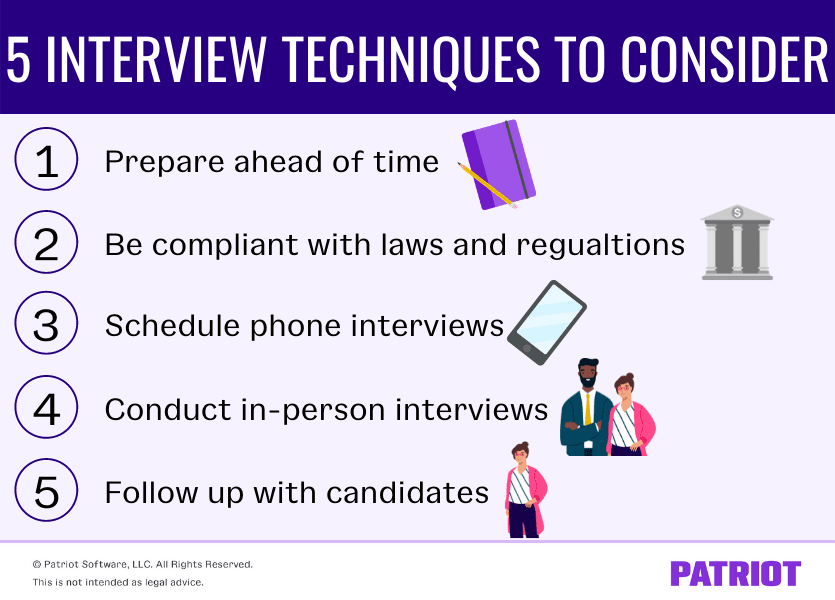So, you’ve created your job listing, posted your open position, and started receiving applications. The next step is to figure out who to bring in for an interview and how to interview candidates. That means learning some interviewing techniques. Take a look at some interview techniques that can help you narrow down your candidate pool for your business.
5 Interview techniques to consider
Before you bring in your candidates, think about how you want the interview to go and what information you need to find out. Here are five interview skills to keep in mind when you’re getting ready to interview a candidate.

1. Prepare ahead of time
When you narrow down resumes that fit the open position and figure out who to contact for an interview, it’s best to prepare ahead of time. Being prepared beforehand lets you know how to proceed and what information you want to gather pre-interview. And, preparedness is part of how to be a good interviewer.
This step is not part of the interview process, per se, but it is important because it gives you an idea of what you need to know. After all, the interview styles can differ between positions. For example, you might ask different interview questions when hiring a cashier than you would when hiring a pastry chef at your bakery.
To prepare for the interview, ask yourself what you want to know about the candidate and their skills. Jot down notes on a copy of the applicant’s resume or onto a notepad.
If you have a standard list of questions you ask all interviewees, attach it to the candidate’s application and resume. Add any additional questions you may have to the list. Consider using open-ended questions to prompt detailed responses from interviewees.
Determine how long the interview should be. Do you want to set aside 15, 20, or 30 minutes? Would an hour be better? Look through the questions you want to ask the candidate and determine if you want to give them a tour of your business. Pick a timeframe that works for you and does not have you rushing from an interview to another meeting.
2. Be compliant with laws and regulations
Before you contact the applicant to schedule an interview, review your interview questions. Remember that the Equal Employment Opportunity Commission (EEOC) and Americans with Disabilities Act (ADA) set laws regarding discrimination. And, candidates can use those laws if they feel discriminated against during the interview process.
Simple questions like “Where are you from?” can even pose a problem. Why? Because not hiring a candidate who answers this question could result in claims of discrimination based on national origin.
Also, avoid asking questions about the following to avoid claims of discrimination:
- Race
- Religion
- Color
- Sex
- Age
- Disability
- Genetic information
Have someone at your business (e.g., a human resources representative) review the questions before you schedule an interview. Especially if you want to…
3. Schedule phone interviews
It’s true that phone interviews are an extra step in the process that can sometimes feel unnecessary. But, don’t miss the opportunity to further weed out potential candidates. It might save you time that could have been better spent on another candidate in the long run.
Benefits of phone interviews include:
- Hearing how a potential employee speaks over the phone. If your position includes phone communication, a phone interview gives you an idea of how the candidate would do in the position
- Screening applicants with basic questions to identify what follow-up questions you might ask in a face-to-face interview
- Breaking the ice before meeting in-person
- Saving time if you determine the applicant is not the right fit for the open position
You may be asking, Should I schedule a phone interview? And the answer is: maybe. There are pros to scheduling a phone interview, but there are also advantages to surprising candidates with a phone call.
Pros of scheduling a phone interview include:
- Knowing a good time to reach a candidate
- Giving the applicant time to prepare (e.g., find a quiet place to talk)
- Setting aside time in your day to fully focus on the interview
Pros of surprising candidates with a phone interview include:
- Learning how candidates react to and handle unanticipated situations
- Determining if a candidate can adjust to distractions
- Fitting the call into your busy schedule whenever it fits
Keep in mind that a phone interview is not necessary, but it can help you learn important information about candidates.
4. Conduct in-person interviews
So, you’ve prepared, made sure your interview questions are all compliant, determined which candidates to bring in, and are ready to interview face-to-face? Great! Now comes the part where you need to hone a few in-person interview techniques.
How to interview candidates comes down to a few factors, including the position and if you did a phone interview. But for the most part, follow these steps:
- Schedule a time with the candidate
- Review the candidate’s resume, application, pre-employment questionnaire (if applicable), and phone interview notes (if applicable)
- Gather the applicant’s paperwork and attach your questionnaire
- Read through any notes you’ve taken about the candidate, either from looking at their resume or the phone interview
- Be timely when meeting with the candidate
- Use positive body language (e.g., make eye contact)
- Establish rapport before beginning the interview. Ask questions not specifically related to the position and let the candidate do most of the talking
- Ask open-ended questions using your prepared list or on-the-fly if you need the candidate to elaborate
- Take thorough notes. You will use these notes to look back on when making your hiring decision
According to Tyler Wall, CEO and Founder of SD Bullion, rapport is key to conducting an interview:
Put them at ease by breaking the ice and building rapport before you ask the formal interview questions. When they feel at ease, they can answer and perform more naturally, giving you better insights into their skills and personalities. Plus, it will make the interview enjoyable and smooth for both of you.”
Pay attention to factors outside of the interview, too. Ask yourself questions like:
- Did the candidate show up on time?
- How did the applicant appear? Did they dress professionally and appropriately?
- Was the interviewee alert and engaged during the interview?
- What did the non-verbal cues communicate?
Consider having another member of your team present with you during the interview. For example, you may ask a member of your HR department or the department manager to accompany you in the interview. If someone will be with you, prepare together before the interview.
| Hiring an employee isn’t the last step in the process. After you hire, it’s time to pay your employees. Start your free 30-day trial of Patriot’s online payroll software today. And, check out our HR add-on for an easy place to store employee documents, such as new hire letters. |
5. Follow up with candidates
After you wrap up your interview, let candidates know you will be in touch to follow up on the next steps. Whether that’s to communicate your hiring decision or schedule another interview, it’s important to touch base. Do not delay in letting candidates know your decision.
Notify your interviewee of your decision or next steps by phone or email. Remain compliant if you choose to go with another candidate. Do not give the applicant excuses that could open you up to liability. If you are unsure of what you should or should not say, check with a member of your HR team or consult a business lawyer.
This article has been updated from its original publication date of June 27, 2013.
This is not intended as legal advice; for more information, please click here.


